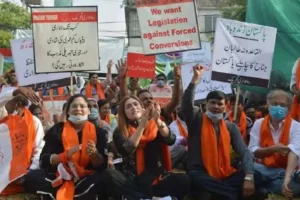Activists of Rawadari Tehreek hold a protest against forced conversion at Lahore Press Club on Aug. 11. (Photo: Samson Salamat)
By Aftab Alexander Mughal 25 Janaury 2023
Pakistani religious minorities have welcomed the recent United Nations statement on the abduction, forced religious conversion and forced marriage of minority girls, Christians and Hindus in Pakistan.
In the past few years, a large number of Christian and Hindu families have lost their daughters, one after the other. These girls were kidnapped and forced to convert, then forcibly married to their older captors. The majority of these girls come from poor families, and the powerful kidnappers get support from conservative religious leaders and law enforcement agencies. Later, these victims often face domestic violence and childbirth complications.
For many years, human rights organizations have raised their concerns against these atrocities.
In a statement issued in Geneva on January 16, United Nations human rights experts, including the Special Rapporteur on Violence against Women and Girls and the Special Rapporteur on Freedom of Religion or Belief, expressed concern about the increasing cases of forced religious conversion of minor girls and young women belonging to religious minorities. These experts called for immediate steps to confront these cases and justice for the victims.
Minorities have expressed their appreciation for the issuance of the international statement. They said the UN statement highlighted multiple violations of both Pakistan’s domestic law and the country’s international obligations.
In that context, Aqsa Kanwal, a human rights defender from Faisalabad, said: “Kidnapping, forced religious conversion and marriage are matters that contradict the rights of girls and women.” Stressing the UN statement she said that it was a welcome step and means that the case has received international attention.
She added, “We urge the Pakistani government to take this matter as a matter of concern. This is the time to accelerate our struggle for women’s rights, so we must show the brighter side of our country to the world.”
The United Nations experts said in their statement, “We call on the government to take immediate steps to prevent these acts and to conduct a thorough investigation of them objectively and in line with domestic legislation and international human rights obligations. The perpetrators must be fully held accountable.”
They added, “We are deeply disturbed to hear that girls as young as 13 are being kidnapped from their families, smuggled to places far from their homes, forced to marry men sometimes twice their age, and forced to convert, all in violation of international human rights.”
And they continued, “We are very concerned that such marriages and religious conversions are taking place under the threat of violence against these girls and women or their families.”
The UN experts’ statement pointed to institutional bias against these females, with both the police and judiciary often providing support to the perpetrators, a local newspaper said.
Some religious leaders often claim that minority women and girls convert to Islam of their own free will. But the question is why are religious converts always young and not old or men?
Neither the government and other state institutions nor even the judicial system deals with this issue, for fear of the religious lobby.
Because of the fear of uproar that might arise, the Sindh provincial governor has not signed a bill banning conversion of any minor (under the age of 18) yet, although the bill was approved by the Sindh Provincial Assembly in 2016. Under this bill, a penalty is imposed severe against perpetrators of forced religious conversion. The other provincial assemblies are still silent on this matter.
The United Nations considers the abduction, religious conversion and marriage of girls belonging to minorities to be a form of modern slavery.
In a related context, Pakistani human rights activists spoke about the issue of violence against vulnerable girls who are not allowed to return to their families. In many cases, they are victims of trafficking.
Activists added that the Pakistani media, which is under the influence of the religious right, often does not shed light on these cases.
As for the court system, for its part, it accepts forged papers and fabricated testimonies regarding religious conversion and the legal age of marriage for girls.
Successive governments have failed to hold those involved in these heinous crimes accountable. Therefore, criminals easily escape punishment, taking the lives of thousands of young women.
Minorities called on Pakistan to facilitate access to justice for these victims and their families. They asked that the government must take the international community’s concerns seriously, and reduce injustice to the victims. Moreover, the government must protect the vulnerable segments of society that perpetrators exploit in the name of religion. Also, the unfair practices in the country should be stopped.
According to Aleteia, Catholic Archbishop Sebastian Shaw of Lahore showed his concerns on this issues and said the Church is continuing to bring attention to the problem and seek help from government officials and Islamic leaders.

